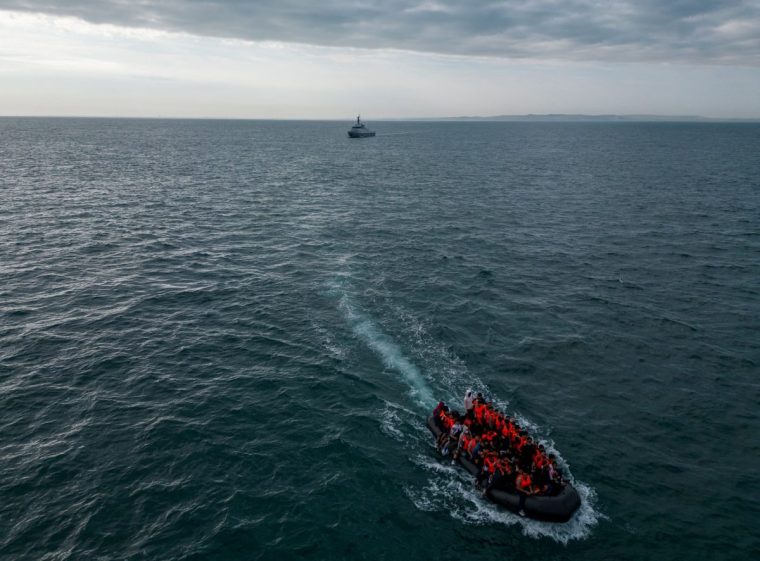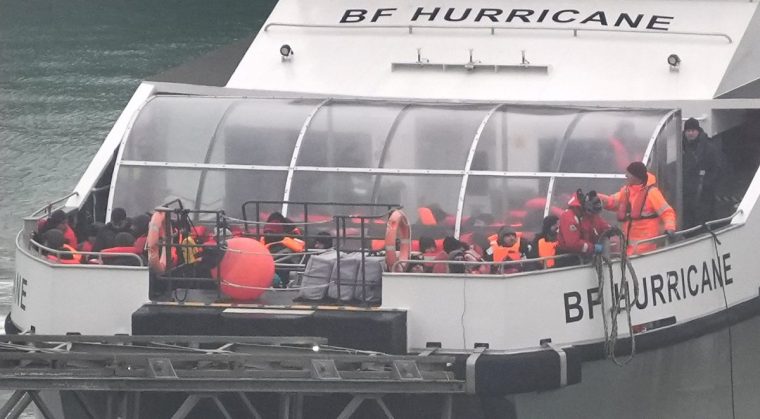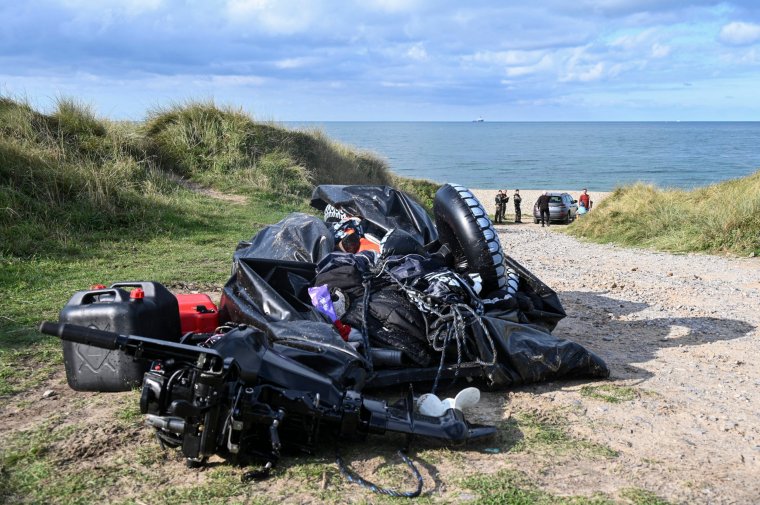“There’s a hole in the boat, lots of water and not everyone has life jackets.”
This is one of hundreds of distress calls made from small boats in the Channel to a humanitarian hotline in 2024, which reveal the chilling details of the journey made by more than 30,000 people so far this year.
Utopia 56, a humanitarian organisation supporting migrants in northern France, received approximately 400 calls for help from vessels trying to cross to England from the start of January to mid December – including from dinghies carrying children.
In call logs seen by The i Paper, some reported that fellow passengers had fallen into the water, while several said they had holes in their boat or broken motors.
The boats are believed to have been overcrowded, with two holding between 90 and 100 people, according to those on board.
Thirty-four of the boats which gave information to the hotline reported having between 70 and 80 people on board, while several said there were children and women.
Smuggling gangs are cramming more migrants onto small boats crossing the Channel from France in a bid to evade police patrols and boost profits, aid workers have said, raising the risk of the boat capsizing or bursting.
The English Channel is the busiest sea route in the world, making the route even more perilous in a small boat.
Some gangs are using DIY boats made of plywood barely a millimetre thick, with “bouncy castle” style pipes and tiny engines that are at risk of breaking down in the middle of the journey.
“There’s water in the boat,” one caller reported in mid February at 11.55am.
A caller in June said his group were in “two leaky boats”. The following month, a caller said “the engine has broken and people have fallen in the water”.
“Some people are in the water. There’s no life jackets. They’re in great distress,” the call log reported from an incident in August.
A caller in November said: “The engine has fallen into the water. We are drifting to the coast.”
Utopia 56 operates a humanitarian helpline that migrants sometimes call when in distress at sea. The organisation then pass the calls on to the French or British coastguard, though on some occasions authorities were already present when the calls were made.
Labour has pledged to crack down on small boat crossings by dismantling smuggling gangs operating the journeys, but experts warned an enforcement heavy approach could simply push migrants to take more risks.

The total number of distress incidents is not clear. The calls come from two separate logs which record them in slightly different ways, leading to possible disparities, and some of the calls could be from the same boat.
The majority of the calls were made from the sea around Calais and Grand-Synthe – both are areas from which migrants depart – while a small number of calls were made by people on land who were concerned for the wellbeing of friends or family on board.
One was made from a ferry which had spotted a dinghy in the Channel.
Several were made in the early hours of the morning.
October saw the highest number of calls with 74, which could be due to weather conditions. This was followed by 60 in February and 43 in November.
Channel crossings generally peak in the height of summer due to lower wind speeds and higher temperatures. Crossings in autumn or winter can be even more dangerous due to biting winds and icy, choppy waters.

In September, six children and a pregnant woman died on the route, in what was believed to be the worst Channel disaster since 27 people perished while trying to reach the UK in 2021.
Home Office figures reveal there have been 35,000 small boat arrivals in 2024 in total, compared with 29,000 last year and 45,000 the year before.
The crossings show no signs of abating in 2025, experts warned.
“We’ve already seen more deaths in the Channel this year than any other – that must not continue in 2025,” said Dr Wanda Wyporska, chief executive at Safe Passage International. She called on the Government to open new safe routes to allow people to reach the UK.
Last year, 99 per cent of people who arrived on small boats made a claim for asylum, meaning they requested refuge in the UK on the grounds of persecution or threat in their own country.
To claim asylum in the UK, a person must be physically in the UK. There is no visa to travel to the UK to make an asylum claim.
According to Oxford’s Migration Observatory, this means that people who do not have another form of visa – or are from the 67 countries which need visas to get to the UK – do not have a legal route to seek asylum in the UK.
Those who do not have access to a passport, either because they never had one or because it was lost or abandoned during the rush to flee their home, also cannot travel to the UK safely to seek asylum, the Observatory said.
The UK does have some routes for other kinds of refugee resettlement in the UK. Most are nationality specific – for Afghans, Ukrainians and Hong Kongers – while some are run by the UN, but people cannot apply for these.
Home Office sources said the department’s priority was the relocation of those who have already been identified as eligible for resettlement under these schemes.
Dr Wyporska suggested there could be an increase in the number of Syrian refugees if the promise of a new, fairer regime failed to materialise following the fall of dictator Bashir Al Assad.
“We could see more people needing to flee for their lives and without safe routes for them to do so, this could leave people with no option but to take dangerous journeys,” she said.
The number of Afghans taking small boats to the UK may decrease, Dr Wyporska said.
“We’ve also finally seen arrivals through the schemes for Afghans have ramped up considerably in 2024, with nine times more Afghans arriving this year through them than last year.
“There was also a slight reduction in the numbers of Afghans arriving across the Channel this year. Whilst we cannot conclude these trends are linked, we might see these patterns continue next year.”

Dr Wyporska predicted the number of Sudanese nationals would remain high.
“We’re also working with the Sudanese community, helping them to reunite with family amidst the horrifying war in Sudan. Many of them are unaccompanied children trying to join what little family remains,” she said.
“We know there are high numbers of Sudanese people in Northern France, and it’s one of the top nationalities crossing the Channel already.
“With the conflict and humanitarian situation in Sudan only worsening – more children have been forced to flee their homes than anywhere else in the world – it’s likely we will see more people trying to make this dangerous journey in the hopes of finding protection here.”
Enver Solomon, CEO of the Refugee Council, said: “One thing stands out from every single year; there is a significant number of people coming from countries like Sudan, Afghanistan and Eritrea where there is tyrannical rule or very nasty conflict and large numbers of people are being displaced.
“We have to recognise that when there is war, conflict bloodshed, terror or violence in countries where people have a link to the UK – whether because of historical ties or large diaspora communities here – people will continue to do what they can to get to the UK, because the choice in their mind is between life and death.”
Mr Solomon said the Government’s plan to crack down on people smuggling gangs “isn’t a magic bullet”.
“There needs to be a policy about legal routes. Small boat crossings will continue next year without government policy change. This isn’t going to go away.”
A Home Office spokesperson said: “We all want to end dangerous small boat crossings, which threaten lives and undermine our border security.
“We will stop at nothing to dismantle their business models and bring them to justice.”
The new Labour Government has launched a £150m Border Security Command to enhance efforts to investigate, arrest, and prosecute smugglers.


